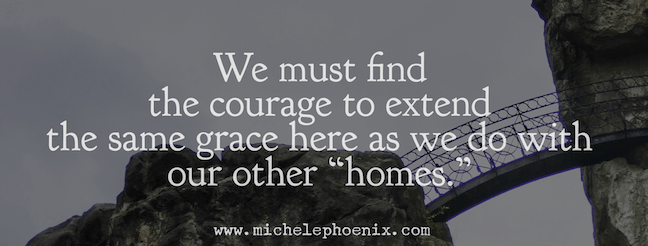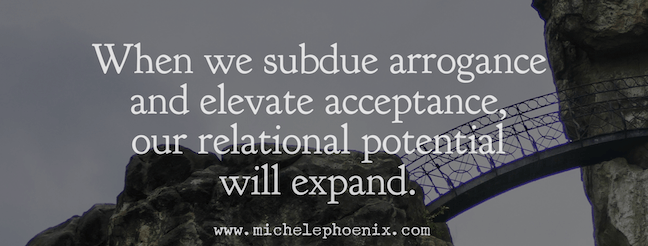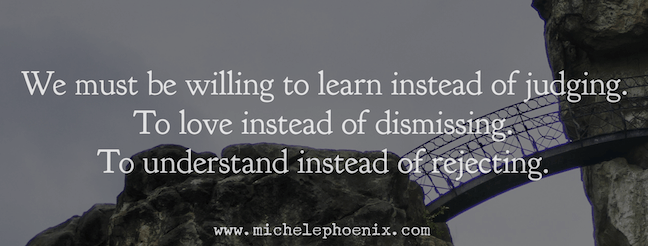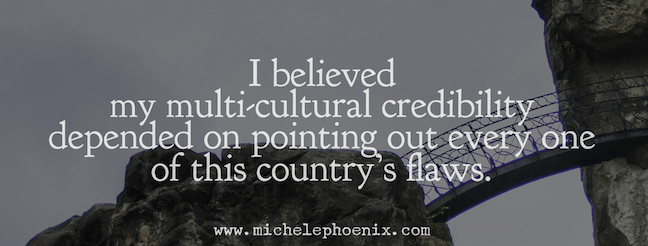Please note: This article is about a Third Culture Kids’ relationships with individual Americans (the people), not about our views of America (the geo-political power) and its Washingtonian shenanigans. I address those in this separate post.
If someone had asked me, when I returned to the States for college, what I liked about this country, I would have said, “nothing.”
Not the people, not the places, not the culture, nothing. Even the food felt insulting. (What can I say, I’m an MK from France—if it isn’t buttery or saucy, it’s irrelevant to me!)
While excusing all kinds of wrong behaviors and dubious ethics in the foreign places that were truly Home to me, I let nothing slide with the one place for which my family held passports. I vowed to keep this country safely at arm’s length and believed my multi-cultural credibility depended on pointing out every one of its flaws.
Since moving back to the States again five years ago, I’ve gotten a clearer perspective on what I did wrong on that first transition to my passport culture, and I feel compelled to address it now in the hope that the lessons I’ve learned since then will be useful to others.
BE UNBIASED

To be honest, the “transition prep” sessions I had to sit through before graduating high school didn’t help. Kind-hearted souls pointed out everything I’d find difficult in the “Land of the Brave.” Nobody would ever understand me. I’d find my peers immature, relationships shallow and the mindsets puritanical.
Though the instructors thought they were preparing me, they were actually planting the seeds of judgment and distrust that would eclipse any chance of transitioning well. I believed the dire predictions and transitioned with a chip the size of Gibraltar on my shoulder.
I came “home” to this country—which had never really been home—looking for reasons to dislike it, for traits in its people that confirmed my worst expectations, declaring verbally and non-verbally that I would never become “one of them.”
But we’re MKs, right? We’re tolerant, open and culturally flexible…except when it comes to people “back home.”
We can do better. Just as we’d extend acceptance to a remote tribe whose beliefs and practices are vexingly contrary to ours—using that prized Cultural IQ we’ve acquired in our nomadic years—MKs must find the courage to extend the same grace and flexibility to members of our passport culture.
If we intentionally explore what is good and noble in the people of this culture—their strengths and positive traits—and if we show mindfulness by looking beyond the differences to what we do have in common, we’ll set ourselves up not only for inclusion, but for friendship too. And there is true, meaningful friendship to be found here. I’ve lived it.
Inclusiveness is a huge force for good, one that has the power to connect despite the distance between our worlds. True influence is only possible through mutual relationship, and relationship can only come from genuine respect.
BE HUMBLE

The generalizations still run rampant in MK circles, and there’s nothing pretty or helpful about them. All Americans are narrow-minded. They’re all gluttons and power-mongers. They’re all shallow and materialistic. We hate statements like “All MKs are socially inept,” but hesitate not one second to indict “all” Americans with our petty accusations.
Our greatest gripe seems to be (generalization alert!) the average American’s deficient grasp on foreign issues. We shake our heads at their shortcomings and pat ourselves on the back for all we know.
Here’s a reality check: we are not better than our American counterparts because we’ve seen more of the planet, and they are not inferior because they haven’t.
We’ve got to stop belittling people for what they cannot know.
“But they have books and the Internet—they could learn about what’s happening in the rest of the world!” we bluster. Here’s my question to the average MK-reader of this article: who’s fighting in the the war in Sierra Leone? What is the main industry in the capital of Nepal? You don’t know when the government of Latvia fell? Shame on you. It happened just last year!
The bottom line is this: we know about foreign places because they’ve touched our lives. If they hadn’t figured in some way in our experience or that of people we love , we simply don’t know about them either. The same is true of our American counterparts.
It’s not that anyone is stupid, it’s that the world that is familiar and significant to us hasn’t played a role in their lives.
It’s time to start cutting America some slack.
When we subdue arrogance and elevate acceptance, our personal, relational and cultural potential will expand in ways it never could when bound by self-satisfied disdain.
BE WILLING

I’m not sure why I was so committed to disliking this country when I moved here at age 18.
I might have been afraid of getting stuck here if I got to the point where I liked it. Or maybe I resented that I had to be here in the first place. Or maybe it felt safer to consider myself superior than to try to make friends and fail. Or maybe I was sick of trying to explain America and its stances to my friends overseas. (More on these reasons HERE.)
The second time I came back, this time as an adult, I determined to do things differently—to view this country as just another foreign place and to apply the same cross-cultural skills to it as I would to Thailand, Chile or Uganda.
I also decided, on my repeat-reentry, that anger, fear and arrogance (no matter how justified they felt) were damaging traits.
I wanted to display curiosity, intelligence and openness instead. I wanted to explore the differences and engage with the people God brought into my life. I wanted to learn instead of judging. To love instead of dismissing. To understand instead of rejecting. To humble myself instead of posturing.
That doesn’t mean shutting down our judgment and assessment—please don’t hear me saying that. It means initially entering each situation with a willingness (and determination) to give people a chance.
To be honest, it hasn’t always been easy. There have been days when my “transitional energy” was so depleted that I could easily have fallen back into generalizations and making a list of everything that is wrong with “Americans,” then stepping up onto my MK-soapbox to declare it the world.
But that soapbox is a lonely place—I discovered that in college. It’s often an self-defeating place too, one that diminishes me as I condemn others.
What really is “wrong” in those tough reentry moments usually has more to do with my own attitude than with this country’s differences.
We can only control what we bring to the fight—and after five years filled with some frustrations, but also with discovery, delight and true friendships, I can honestly say that changing my mindset has changed everything.
Please join the conversation!
- Contribute your thoughts in the comments section below
- Use the social media links to Like and Share this article
- Many of these articles are now available in podcast form. Simply search for “Pondering Purple” on your usual pod platforms, or click this link to be taken to its host page.
- To subscribe to this blog, email michelesblog@gmail.com and write “subscribe” in the subject line
- Pick up Of Stillness and Storm (my novel about a missionary calling gone awry) on Amazon




Erin
Many great points–particularly for those closest to re-entry and facing major transition. After decades of acclimation, however, including years of assimilation; giving birth to 2 children who are full-fledged, One-culture, American adults now, I can’t help but suggest that some of the criticisms of the US might actually be warranted and fair.
The main difference I see between how I view other world cultures and our U.S. Society has to do with power. People in Thailand or Hong Kong, who’ve never seen other parts of the world, simply don’t wield the same national strength as we in the US do, globally. That power is deeply and unconsciously ingrained in our psyches. Not unlike racial biases here in America (and certainly elsewhere, too), our privilege is part and parcel to our existence, and that’s where ignorance crosses the line from ‘I do not know’ to ‘not my problem; I can do what I want.’
Ignorance was an early prejudice I held against Americans, due to behavior and comments I heard as a child, witnessing American sailors and tourists. The disrespect for the people, the culture, and the foreign, physical place where they were *guests*, was jaw-dropping, agonizing as an American, and often crossed the legal line. Not every single American behaved rudely or callously, but so many did, it was hard to escape (and even harder now–decades later and living here in this culture) the sense of entitlement–to everything, including gripping hold and embracing their own ignorance, instead of learning about the world they’d paid to see.
The issues are vast on this topic and go headlong into the issue of cultural revolution and political change, much needed here in the US, as I’ve watched gender bias sky-rocket; racial atrocity go unchecked, and political falsehoods heralded too many times to count. I’m wondering if discussion more about how re-entering TCKs/MKs can cope with the reality of living amidst those paradigms of entitlement might be most beneficial, because there are very good reasons those young people might be repulsed at being forced to make home here in this place. Perhaps focusing on the ideals of either Christian or secular ministry might encourage best, rather than actually dismantling a very real and likely warranted internal emotion to what we have all experienced about our home country. It’s an approach that would have helped me tremendously.
michele
Thank you for this, Erin. You’re absolutely right! I never meant to imply that America (or any other nation) is “blameless and pure.” 🙂 On a global level, this country does all kinds of things wrong, many of which you mentioned. It has also done a lot right. There is certainly thoughtful discourse and dissent to be had on that broad topic. The problem I wanted to bring up was not the geo-political gripes we have with AMERICA (the politics/policies), but the biased resentment we show to AMERICANS (the individuals).
I’ve gone back and made that clearer at the top of the article.
Even on the topic of the intense societal issues you mentioned (racism, sexual orientation, etc), entering the fray with disdain and antipathy will eliminate any ability a TCK might have to be an influence for good. We need to extend to the faux-pas of this nation the same grace and patience we so readily extend to the faux-pas of others. (I agree with you that more writing on how to live in this changing society is needed…but it was not the focus of this article.)
Sharon M
I wasn’t given the ‘transition prep” message that life in the US would be difficult for me – quite the opposite! As long as I could remember, American missionaries were talking about how much they missed the U.S. and how wonderful it was – it was a land of plenty, a land of milk and honey. When I arrived for college, I learned about racism in the US, exhibited even by some ‘good’ Christians’; about desperate poverty that, while not as severe as poverty I’d seen in Asia, was still appalling; about the systematic betrayal and massacre of Native Americans; and about the lasting effects of American neo-colonalism around the world. This was not the country I had heard lauded and my disillusionment led to my distancing from, or denying, my American identity.
michele
Thanks for this point of view, Sharon. Many MKs I’ve known do not grow up hearing America thus lauded. Please note what I’ve just added to the top of this article, in response to Erin’s comment before yours: this article is about our relationship with Americans (the people), not America (the geo-political power). The latter, as they say, is “a whole ‘nother can of worms!” It was not my intent to broach those historical topics, though I concur with much of what you’re written.
Danny P.
Yes. Yes. And Yes. These are the exact encouraging words that I’d use with transitioning TCK’s. I discovered that others who had grown up in the same town have as much to teach me as I have to teach them. Once I began thinking like that a lot changed.
Frances green
Great article! I look back and think that I could have done better at instilling these attitudes in my kids when we returned to the states. Thanks for sharing from your experience!
Julie B
I was born and raised in Asia. Somehow my experience seems to be so different from many of my MK counterparts. Somehow my parents managed to keep us connected to friends and family in America. We lived in the States on furloughs (that’s what home assignments were called way back then) and cultivated many relationships which I looked forward to coming back to when my college years began. I never had a transition class – in fact “transition” was not even really talked about much in those days. (I do think they did talk about “culture shock” though.)
After I married, our young family returned to Asia. A couple of years later, we had to return to America for ongoing medical needs of one of our children. We raised our kids in America and now have grandchildren there and we find ourselves back in Asia!
I love America and the opportunities (and fast internet) available there. I love Asia too (all except the massive crowds and spitting). I think Michele, you are right – it is all in our attitudes. We need to be humble, teachable,inclusive and willing in whatever culture we find ourselves. God is at work around the world – And if we humbly look for what He is doing in whichever culture we find ourselves in, we can be awed and thankful for the privilege of participating in His plan for reaching the nations – even our own culture!
Elisabeth
One issue that seems to affect the TCK is loyalty…if they are passing through other places there is no loyalty issue, but if they are staying in their passport country, then there is a perceived loyalty issue with their childhood home.
Another issue is patriotism and what each country’s culture or individual considers to be checkpoints of patriotism. It feels like USA’s culture there is an all or nothing decision presented to the TCK and whichever way you decide is a lose/lose.
Our family lives with knowing no matter where we live there will be good/great things and there will be hard/sad things…we talk about that perspective for where we are presently living, where we have lived, and where we will be moving.